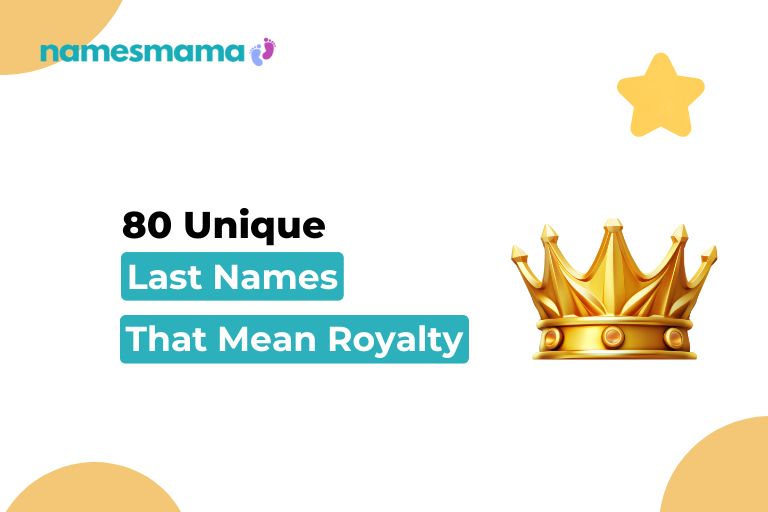75 Unique Last Names That Mean Hope
Your last name can hold a lot of meaning, linking you to your family history, background, and even feelings.
If you like names that stand for staying positive and bouncing back, last names meaning hope are a great pick.
These surnames come from different languages and customs showing a sense of what’s possible, belief, and a good future ahead.
Whether you’re looking into your family tree or trying to find the right name for a character, this list of last names that mean hope will give you some ideas!
Last Names That Mean Hope
Esperanza (Spanish) – Derived from the Spanish word for “hope,” symbolizing optimism and faith.
Hope (English/Scottish) – Directly means “hope” in English, representing positivity, aspiration, and expectation.
Naděje (Czech) – Comes from the Czech word for “hope,” signifying belief in better times.
Nadeau (French) – Originates from Old French nadal, meaning “hope” or “expectation for something better.”
Nadziejko (Polish) – Derived from nadzieja, meaning “hope” and trust in the future.
Hoffmann (German) – Related to hoffen, meaning “to hope,” expressing faith in possibilities.
Hofer (German) – Comes from hoffen, meaning “hope,” originally given to optimistic individuals.
Hoffner (German) – Derived from hoffen, meaning “to hope,” indicating a person with strong faith.
Bonaventura (Italian) – Means “good fortune” or “good hope,” representing luck and positive expectations.
Boniface (French/Latin) – From bonifatius, meaning “good fate” and a hopeful, blessed future.
Umeda (Japanese) – Derived from ume (plum) and da (field), symbolizing hope and renewal.
Umidov (Uzbek/Turkic) – Rooted in umid, meaning “hope,” given to optimistic families.
Tikvah (Hebrew) – Means “hope” in Hebrew, symbolizing resilience and trust in the future.
Rajabov (Tajik) – Comes from Rajab, an Islamic month associated with hope and blessings.
Omidi (Persian) – Derived from omid, meaning “hope” and “aspiration for something better.”
Tariro (Shona, Zimbabwe) – Means “hope,” signifying trust in a better future.
Themba (Zulu, South Africa) – Directly translates to “hope” and “faith” in achieving success.
Chinotimba (Shona, Zimbabwe) – Means “we hope for peace and better days ahead.”
Ashaari (Swahili/Arabic) – Related to Asha, meaning “hope,” and a strong belief in destiny.
Emani (Hausa/Nigeria) – Derived from iman, meaning “faith” and “hope in life’s journey.”
Nadezhdin (Russian) – From nadezhda, meaning “hope,” often given to those with resilience.
Nadein (Russian) – Derived from nadezhda, meaning “hope” and belief in new beginnings.
Viltis (Lithuanian) – Directly translates to “hope,” signifying a family of strong aspirations.
Spes (Latin) – An ancient Roman name meaning “hope” and divine expectation.
Hoffmanns (Dutch/German) – Variant of Hoffmann, meaning “one who holds onto hope firmly.”
Amundsen (Norwegian) – Derived from Old Norse Amundr, meaning “hope” and “protection from fate.”
Kibou (Japanese) – Means “hope” in Japanese, often linked to perseverance.
Spero (Italian/Latin) – From sperare, meaning “to hope,” symbolizing trust in the future.
Batbayar (Mongolian) – Means “strong hope,” indicating a powerful belief in success.
Chisomo (Chewa, Malawi) – Means “grace and hope,” often given to those overcoming struggles.
Hopewell (English) – Means “a place of hope,” indicating optimism and bright prospects.
Hoepner (German) – Related to hoffen, meaning “to hope” and “expect something good.”
Nadalin (Italian) – Derived from natale, meaning “birth” and hope for new beginnings.
Nadalini (Italian) – Variant of Nadalin, symbolizing hope and renewal in life.
Hoffbauer (German) – From hoffen and bauer, meaning “hopeful farmer” or “optimistic worker.”
Bonheur (French) – Means “good fortune” or “happiness,” linked to hopeful outcomes.
Bonnet (French) – Derived from bon, meaning “good” and linked to hopeful intentions.
Spéranza (Italian) – Variant of Speranza, meaning “hope,” often associated with faith and belief.
Bonavia (Italian) – Means “good path” or “hopeful journey,” representing positivity in life.
Bona (Italian/Latin) – Short for bonus, meaning “goodness” and the hope for prosperity.
Umedov (Tajik) – Rooted in umid, meaning “hope,” common in Central Asian cultures.
Umitov (Kazakh) – Derived from umit, meaning “hope” and “trust in the future.”
Omidi (Iranian/Persian) – From omid, meaning “hope,” often linked to positive expectations.
Tajuddin (Arabic) – Means “crown of faith,” symbolizing religious hope and devotion.
Amanullah (Arabic/Persian) – Means “trust in God,” reflecting deep faith and hope.
Ashai (Hebrew) – From asha, meaning “hope” and “expectation of good things.”
Tikva (Hebrew) – Means “hope,” commonly used among Jewish communities with strong faith.
Rajabi (Arabic) – Related to Rajab, an Islamic month symbolizing hope and renewal.
Imanov (Azerbaijani) – Derived from iman, meaning “faith” and “hope in divine will.”
Barakat (Arabic) – Means “blessings” and “hope for prosperity” in many Middle Eastern cultures.
Tarirai (Shona, Zimbabwe) – Means “to hope” and “believe in better days ahead.”
Chidhope (Shona, Zimbabwe) – Means “a child born in hope” and expectation of success.
Amani (Swahili) – Means “peace” and “hope,” commonly given to optimistic families.
Emani (Swahili/Nigerian) – Related to iman, meaning “hope” and “faith in the future.”
Mbali (Zulu, South Africa) – Means “flower,” symbolizing hope, growth, and new beginnings.
Tinashe (Shona, Zimbabwe) – Means “God is with us,” expressing spiritual hope and guidance.
Chisomo (Chewa, Malawi) – Means “grace and hope,” often given to resilient individuals.
Tumaini (Swahili) – Directly means “hope,” commonly used in Kenya and Tanzania.
Salim (Arabic/Swahili) – Means “peaceful and hopeful,” expressing security and positive outlooks.
Zuberi (Swahili) – Means “strong” and “hopeful for a bright future.”
Nadezhdina (Russian) – From nadezhda, meaning “hope,” often given to strong-willed families.
Nadein (Russian) – Variant of nadezhda, symbolizing trust and belief in good outcomes.
Viltis (Lithuanian) – Means “hope,” often associated with determination and resilience.
Spesy (Polish/Latin) – Related to spes, meaning “hope” and strong aspirations for success.
Věřina (Czech) – Means “hope and faith,” common in families with religious roots.
Matuš (Slovak) – Derived from Matúš, meaning “gift of hope” and divine protection.
Dobronravov (Russian) – Means “good character and hopeful nature,” representing optimism.
Jarić (Serbian) – Derived from jaro, meaning “spring” and hope for new life.
Hoffmannová (Czech/German) – Feminine variant of Hoffmann, meaning “one who lives with hope.”
Spesius (Latin) – From spes, meaning “hope,” used in ancient Roman family names.
Kibou (Japanese) – Means “hope,” often used to describe perseverance in challenges.
Sperelli (Italian) – Related to sperare, meaning “to hope” and “to look forward.”
Bat-Erdene (Mongolian) – Means “strong jewel of hope,” symbolizing endurance.
Chinonso (Igbo, Nigeria) – Means “God is near,” reflecting hope in divine guidance.
Zielinski (Polish) – Derived from zielony, meaning “green” and symbolizing renewal and hope.
Spero (Italian/Latin) – From sperare, meaning “to hope,” often linked to optimism.
Aydın (Turkish) – Means “enlightened” and “hopeful,” often associated with wisdom and progress.
Batbayar (Mongolian) – Means “strong hope,” reflecting determination and ambition.
Ilham (Arabic/Turkish) – Means “inspiration” and “hope,” often linked to creative vision.
Navid (Persian) – Means “good news” and “hopeful tidings” in Iranian culture.
Closing Remarks
Hope is a universal emotion, and it has significance across all cultures, and it also has link with last names. I also hope you enjoyed reading this article.







